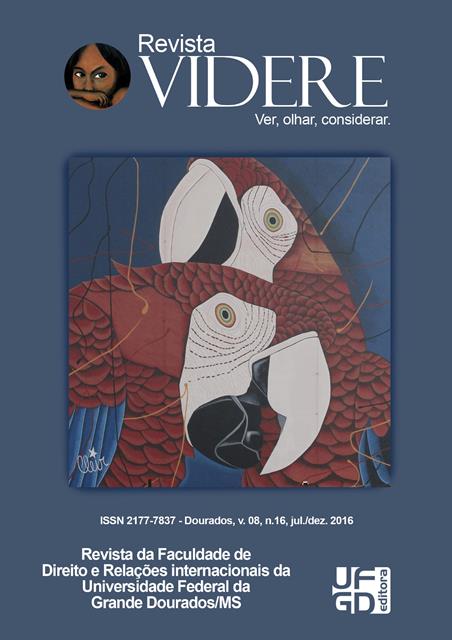O desejo masculino como construção da sexualidade feminina na regulamentação da prostituição
Palavras-chave:
Mulheres. Políticas. Prostituição. Regularização.Resumo
Em tempos atuais, os Estados considerados centrais têm-se dedicado ao debate da prostituição. Porém referido debate está fundamentado em fóruns internacionais que possuem a preocupação de encontrar soluções outras para a problemática da saúde pública ou, ainda, das fronteiras internacionais, ou seja, o tema da prostituição passa, dessa forma, a uma condição de segundo plano, já que é resultante dos discursos referentes ao controle do HIV ou, ainda, do tráfico de seres humanos para sua posterior exploração sexual comercial e/ou imigração ilegal. Neste talante, os Estados centrais tem-se prestado, tão somente, a definir conceitos sobre exercício e exploração da sexualidade, assim como estabelecer teorias de disciplina e/ou regularização e quiçá proibição da prostituição. Olvida, no entanto, que a prostituição é consequência de uma escolha fundamentada em elementos anteriores à sua prática, seja ela forçada, seja ela livre e, por isso, tais discussões elencadas pelos Estados centrais em nada contribuem para a garantia de um futuro diferente para essas mulheres que ‘livremente’ optaram pela prostituição, bem como não desestimulam a prática da exploração sexual futura de crianças e adolescentes, ou seja, a preocupação dos Estados com relação ao fenômeno da prostituição consiste, em tempos atuais no menoscabo do individuo prostituído, pois que promove uma verdadeira coisificação e porque não falar em invisibilidade do cidadão em prostituição. Tem-se, então, a falácia do Estado Democrático de Direito, posto que este, pelo menos no que se refere ao assunto da prostituição, tem-se demonstrado como patrocinador de violência, já que não assegura e ofende às garantias civis e políticas a que todos os cidadãos são possuidores por direito. A importância desse trabalho reside no fato de observar o discurso em torno da construção da sexualidade feminina quando da regulamentação da prostituição. Estaria o referido discurso fundamentado na proteção e reconhecimento dos agentes envolvidos na referida prática ou, somente, mantém os ditames machistas que fundamentam a construção social do patriarcado? Daí, pode-se, então, identificar a real existência da autonomia dessas cidadãs/mulheres ora prostituídas quando da eleição para o exercício da prostituição, posto que, somente a partir de então, podem os Estados, sejam eles centrais ou periféricos, estabelecer políticas e debates no sentido de prevenir a exploração dessas mulheres e o controle da prostituição infantil nos diferentes Estados.Downloads
Não há dados estatísticos.
Downloads
Publicado
2017-02-08
Como Citar
Pedroso, V. (2017). O desejo masculino como construção da sexualidade feminina na regulamentação da prostituição. Revista Videre, 8(16), 115–127. Recuperado de https://ojs.ufgd.edu.br/videre/article/view/5778
Edição
Seção
Artigos
Licença
Os autores devem aceitar as normas de publicação ao submeterem a revista, bem como, concordam com os seguintes termos:
(a) O Conselho Editorial se reserva ao direito de efetuar, nos originais, alterações da Língua portuguesa para se manter o padrão culto da língua, respeitando, porém, o estilo dos autores.
(b) Autores mantém os direitos autorais e concedem à revista o direito de primeira publicação, com o trabalho simultaneamente licenciado sob a Atribuição-NãoComercial-CompartilhaIgual 3.0 Brasil (CC BY-NC-SA 3.0 BR) que permite: Compartilhar — copiar e redistribuir o material em qualquer suporte ou formato e Adaptar — remixar, transformar, e criar a partir do material. A CC BY-NC-SA 3.0 BR considera os termos seguintes:
- Atribuição — Você deve dar o crédito apropriado, prover um link para a licença e indicar se mudanças foram feitas. Você deve fazê-lo em qualquer circunstância razoável, mas de nenhuma maneira que sugira que o licenciante apoia você ou o seu uso.
- NãoComercial — Você não pode usar o material para fins comerciais.
- CompartilhaIgual — Se você remixar, transformar, ou criar a partir do material, tem de distribuir as suas contribuições sob a mesma licença que o original.
- Sem restrições adicionais — Você não pode aplicar termos jurídicos ou medidas de caráter tecnológico que restrinjam legalmente outros de fazerem algo que a licença permita.
(c) Após a publicação, os autores têm permissão e são estimulados a publicar e distribuir seu trabalho online – em repositórios institucionais, página pessoal, rede social ou demais sites de divulgação científica, desde que a publicação não tenha fins comerciais.



















